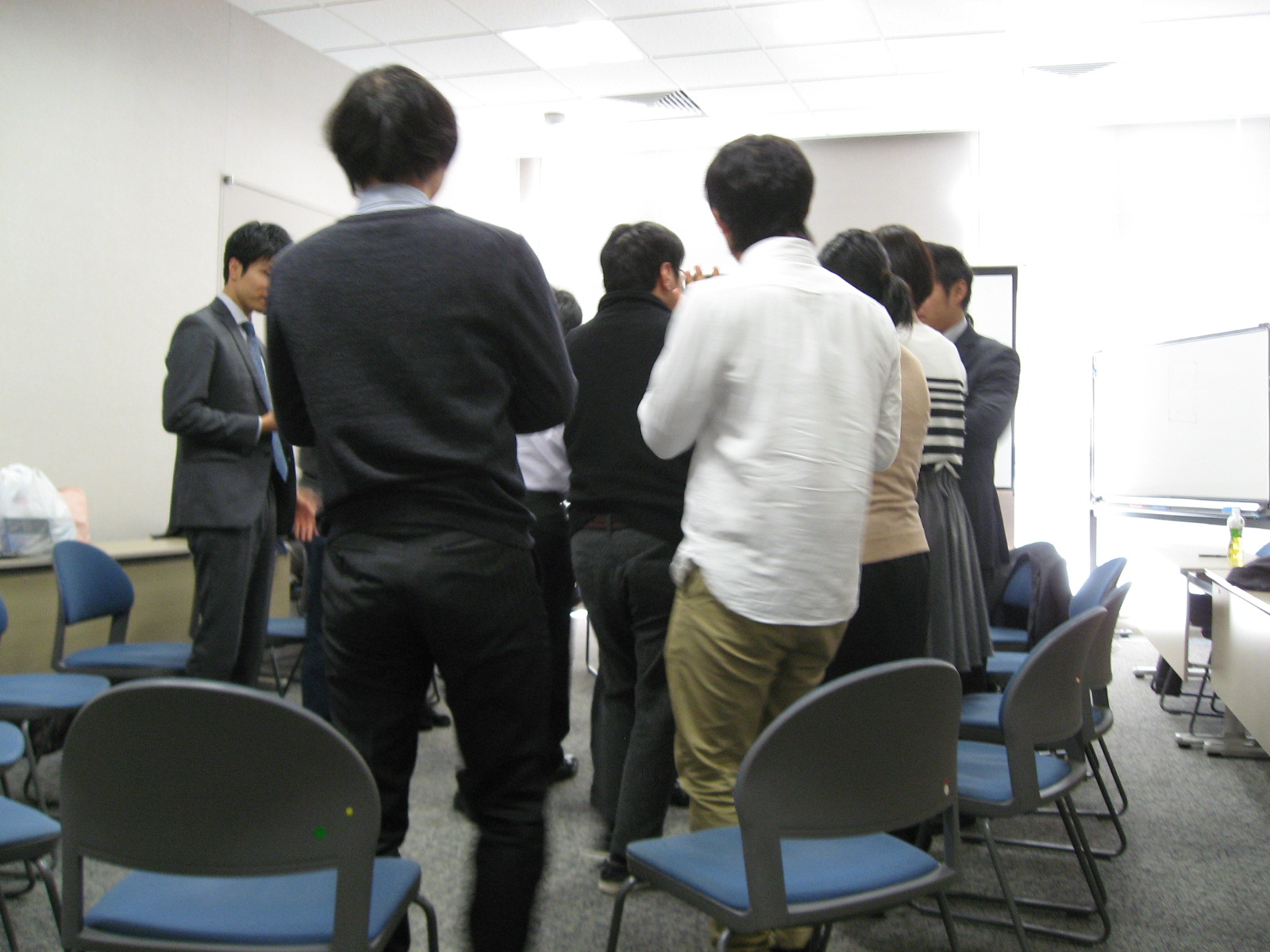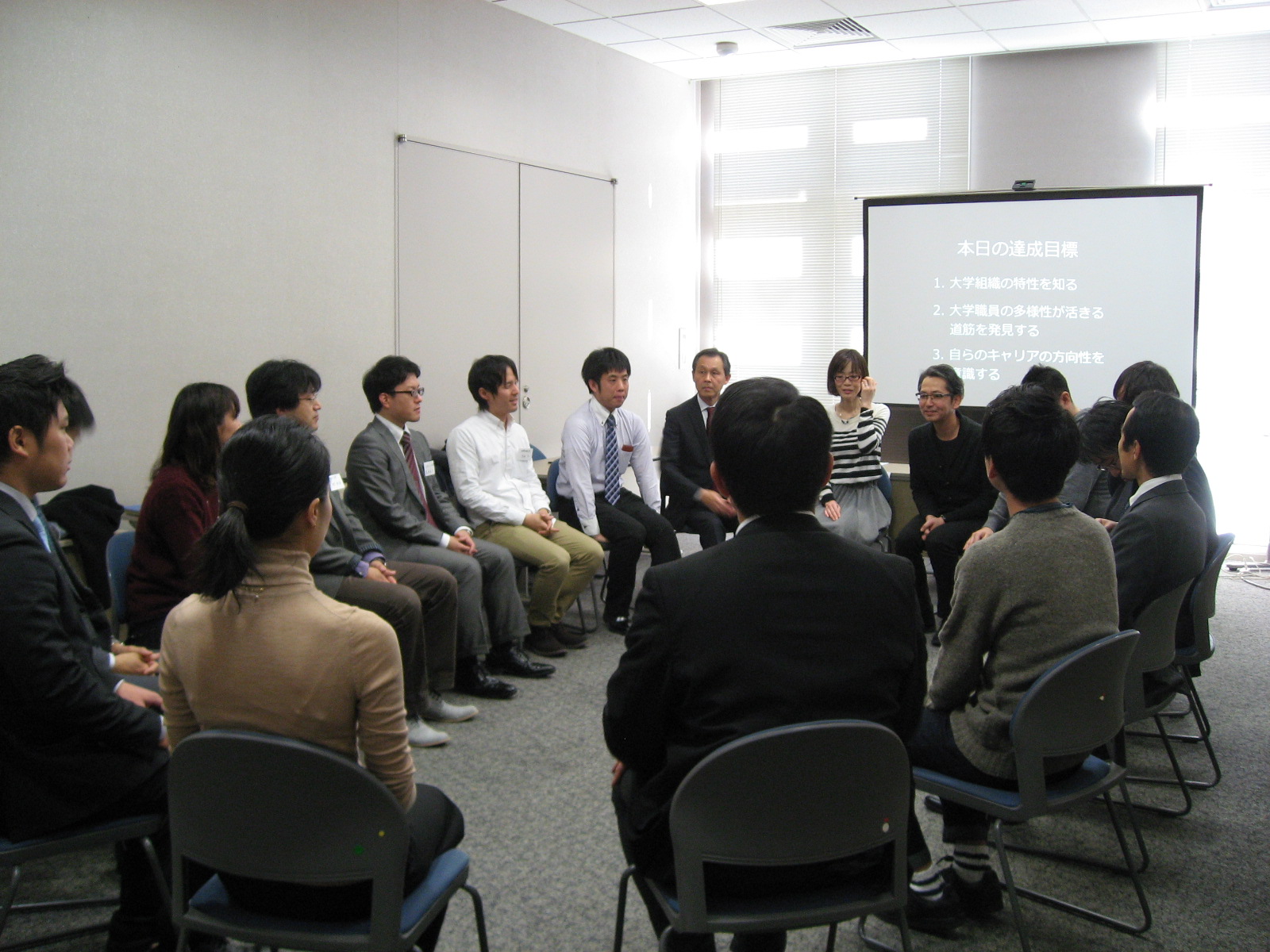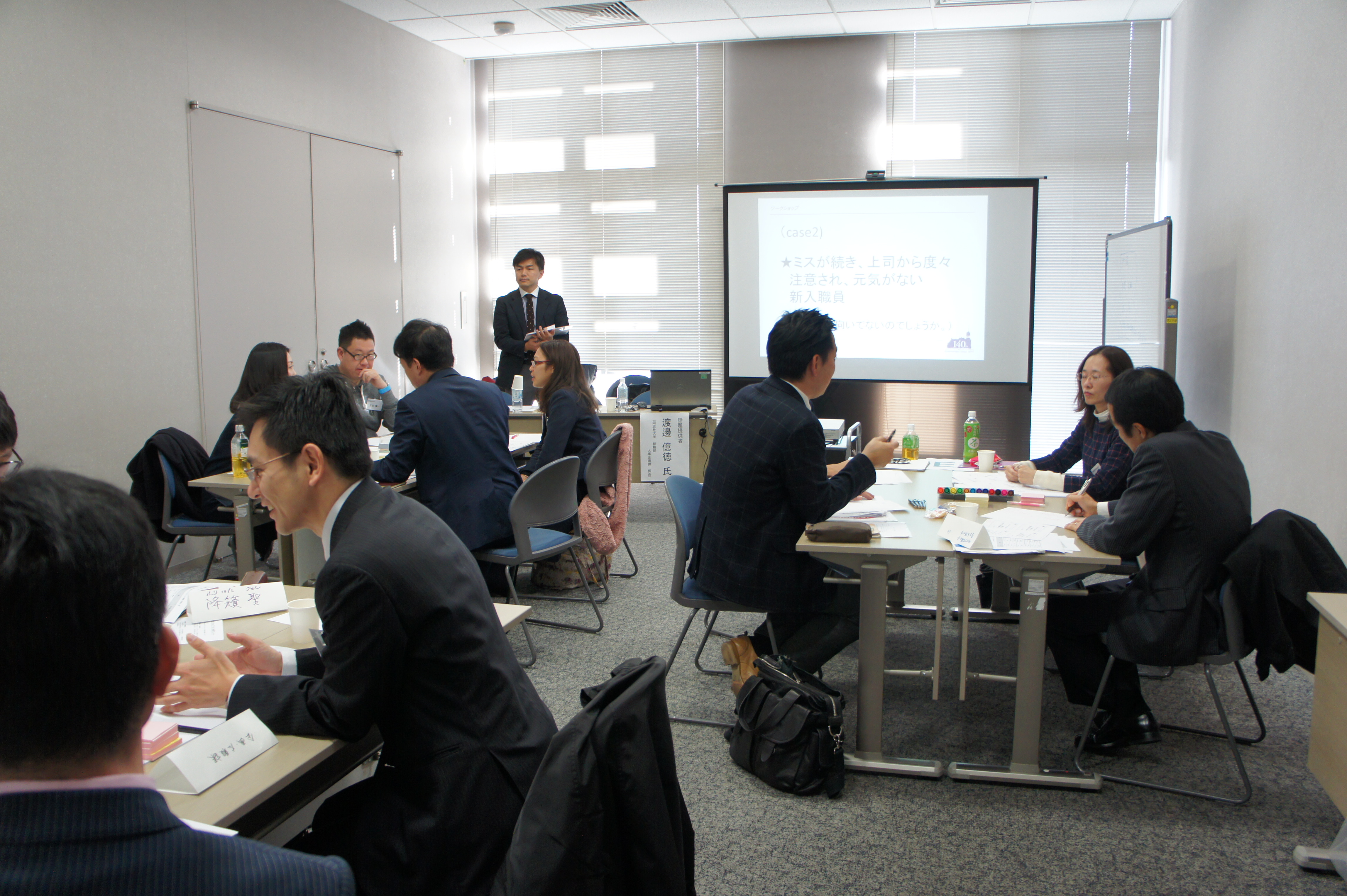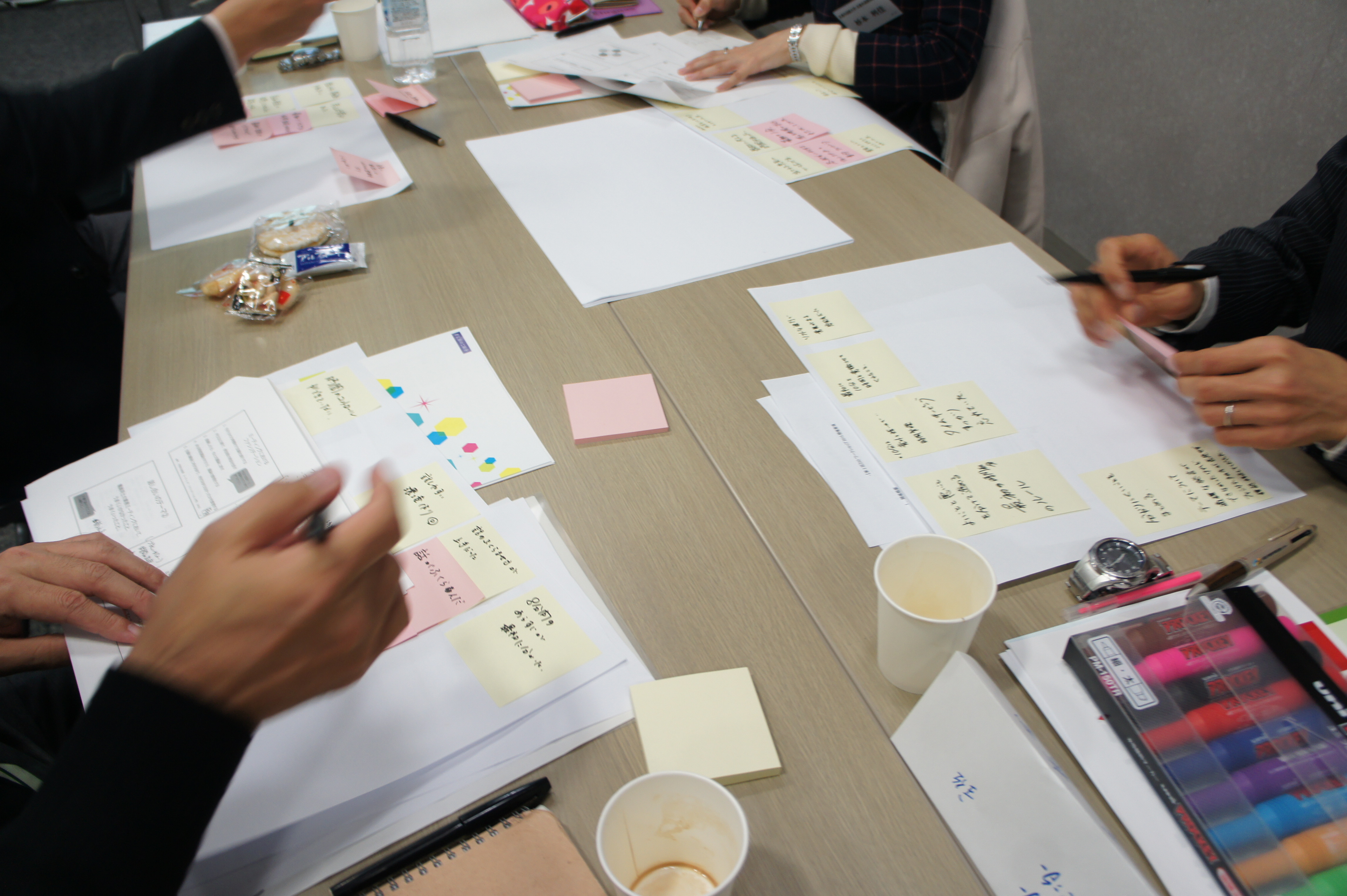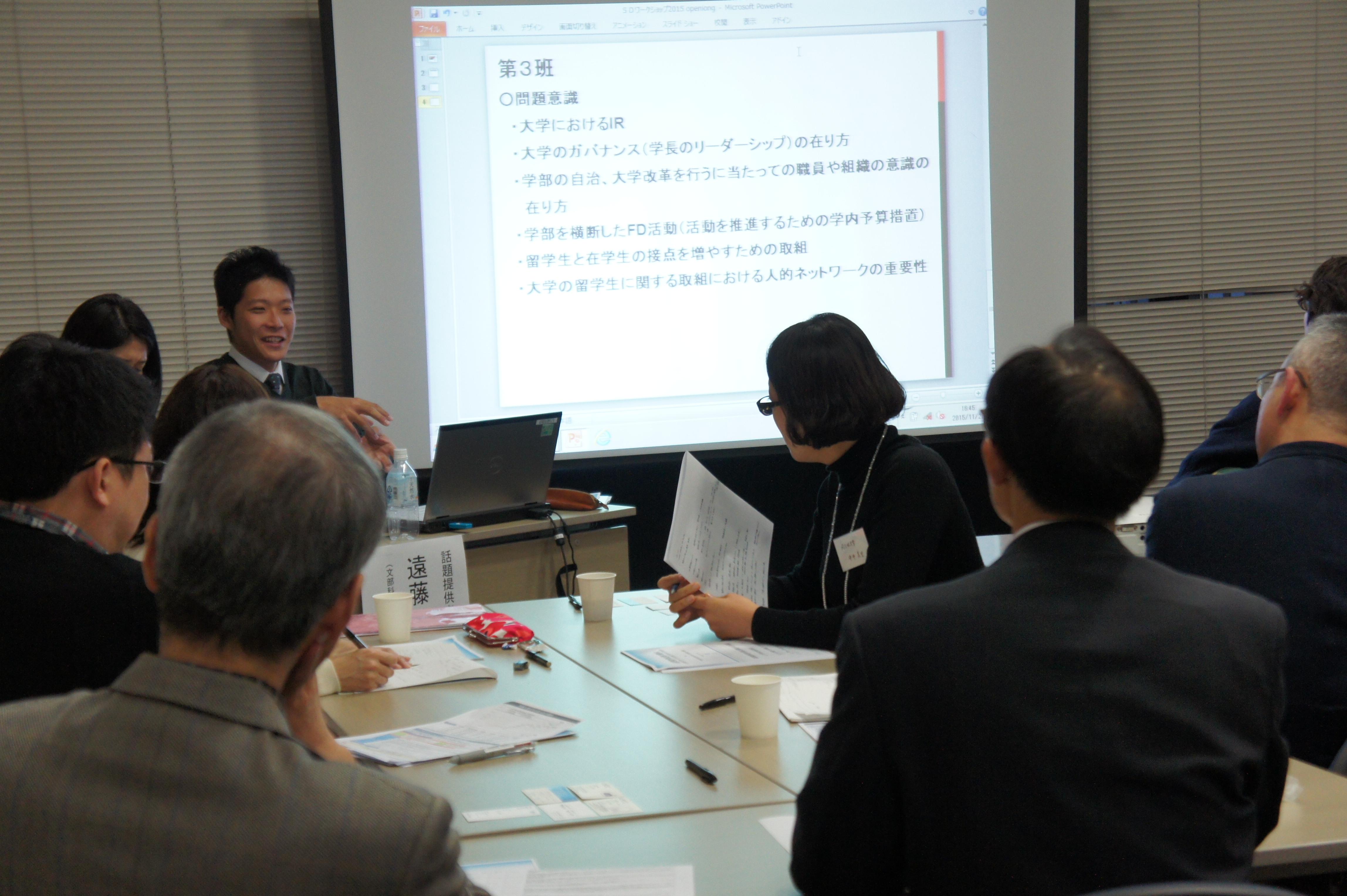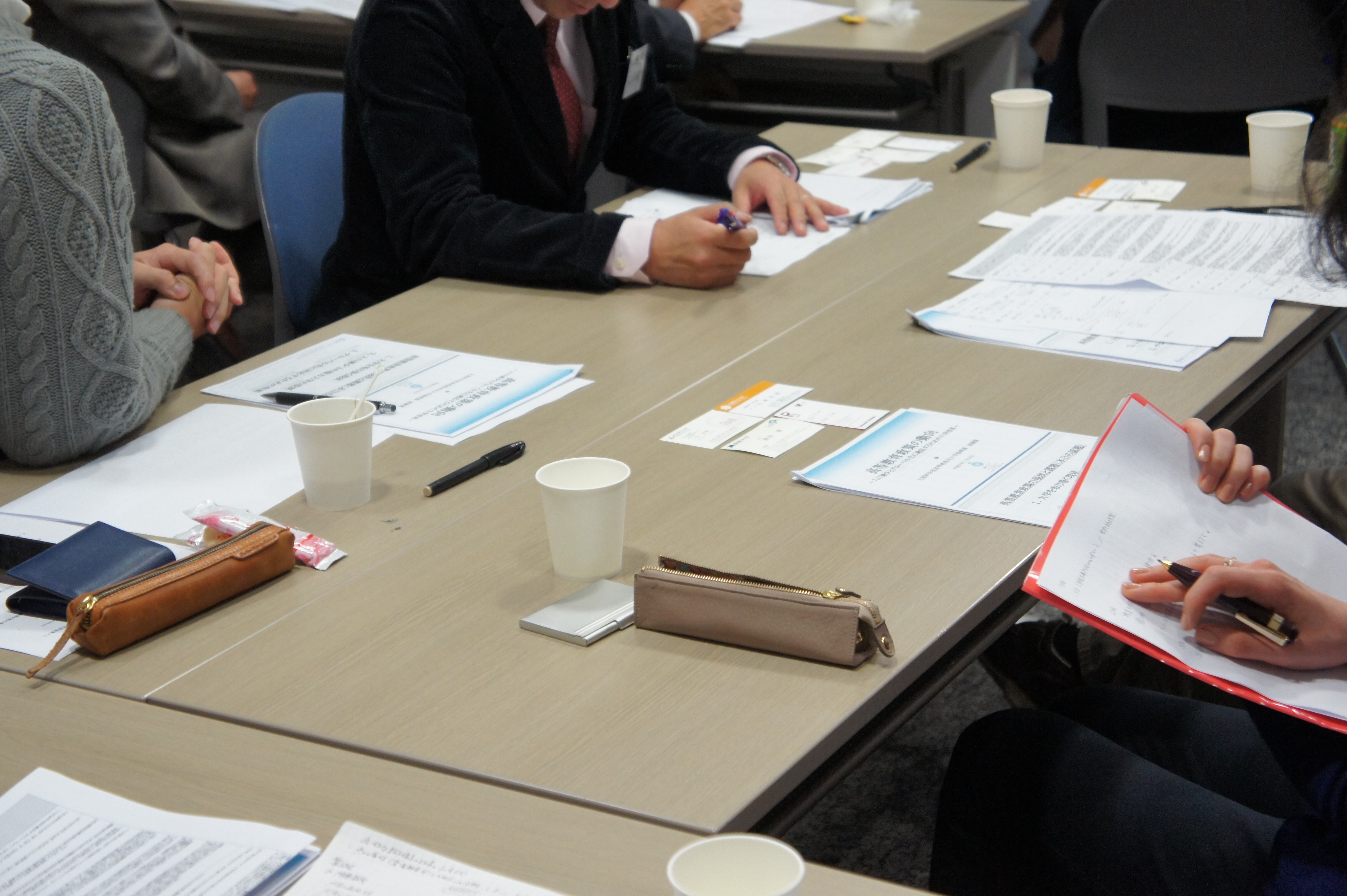Business Overview
In a situation where the environment surrounding universities is changing rapidly, the management and operation of universities has come to occupy an important position, and the role of university staff is becoming extremely important. In order to adapt to such an environment, we are developing a variety of projects to improve the qualifications of university staff, including management and education and research support.
In the SD workshop, students will make new discoveries, deepen their awareness, and create a network of human exchange that cannot be obtained through lectures through discussions with colleagues from other companies in the same industry (staff from other universities).
Outline of the event
| Venue | Campus Plaza Kyoto | |
| Organizer | Public Interest Incorporated Foundation University Consortium Kyoto | |
| Eligibility | University staff (For non-university staff, such as faculty members, please inquire in advance.) | |
| Participation Fee | Member Universities | 1,000 yen per session |
| Non-Member Universities | 2,000 yen per session | |
| Capacity | 20 participants per session * Applications are on a first-come, first-served basis and will close once capacity is reached, even before the deadline. * If the number of participants is significantly below capacity, the session may be canceled. |
|
Session 1: Trends in Higher Education Policy ~University Reform to Adapt to Population Decline and Globalization~
| Date | Saturday, November 28, 2015, 13:00–17:00 |
| Speaker | Tsubasa Endo (Assistant Director, Higher Education Policy Division, Ministry of Education, Culture, Sports, Science and Technology) |
| Application Deadline | Friday, November 20, 2015 |
| Overview | “How do we overcome the major challenges of population decline and globalization?” This is a significant issue for Japanese society as a whole. At the same time, various discussions are ongoing within the Ministry of Education, Culture, Sports, Science and Technology, which is responsible for policy-making. Additionally, the substantial expectations placed on universities from various sectors are widely recognized. This session aims to explore how current higher education policies are being developed within such a broad context, the intentions behind these policies, and the vision for the future of universities, together with the participants. |
Session 2: Basics of Mentoring and Facilitation and Experiential Training
| Date | Saturday, December 5, 2015, 13:00–17:00 |
| Speakers | Okutoku Watanabe (Assistant Manager, Human Resources Planning Division, General Affairs Department, Doshisha University) Ryo Suzuki (F-Lab, Co-op Education Research and Development Center, Institute for Promoting General Education, Kyoto Sangyo University) |
| Application Deadline | Friday, November 27, 2015 |
| Overview | For administrative staff with 5 to 10 years of experience after joining their institution, there are increasing opportunities to take on mentoring roles for juniors and to provide guidance in various situations. Additionally, such staff are more likely to lead meetings and discussions. This workshop aims to provide participants with an understanding of the basics of both mentoring and facilitating, as well as hands-on experience in these areas. The goal is to enable participants to apply these skills effectively in mentoring juniors and managing meetings in the future. |
Session 3: Considering the Characteristics of University Organizations: Experiences and Career Design of University Staff in the “Career Change Group”
| Date | Saturday, December 12, 2015, 13:00–17:00 |
| Speaker | Shozo Fukuoka (Director, Career Design Center, Kyoto Seika University) |
| Application Deadline | Friday, December 4, 2015 |
| Overview | Universities employ two main types of administrative staff: those who joined immediately after graduation and those who were hired mid-career (“career changers”). Career changers bring industry experience from fields such as banking, advertising, and trading companies, contributing significantly to the university’s human resources alongside staff who started their careers at the university. This workshop will explore the unique characteristics of university organizations and how to foster a workplace culture where staff with different careers and expertise can recognize each other’s values and abilities, and perform to their full potential. Discussions will be based on the experiences of career changers who have integrated into the university system through organizational resocialization. |
[Click here to download the SD workshop flyer]
Application
Please download the application form and send it to SD consortium.or.jp as an e-mail attachment. We will reply to you after receiving your application. If you do not receive the e-mail after a few days, please contact the University Consortium Kyoto SD Secretariat.
- 2015 1st SD Workshop Application Form Closed
- 2015 2nd SD Workshop Application Form Closed
- 2015 The 3rd SD Workshop Application Form Closed
Implementation Report
Report on the 3rd SD Workshop
On Saturday, December 12, we invited Mr. Shozo Fukuoka, Director of the Career Design Center, Kyoto Seika University, as a speaker of the SD Workshop Training 2015, and held the third project of the SD Workshop Training 2015, “Considering the Characteristics of University Organizations: Experiences and Career Design of ‘Career Change Group’ University Staff,” which was attended by a total of 15 people from member and non-member schools.
Schedule on the day
・Explanation of the overall purpose, icebreaker
・Lecture and work on the characteristics of the university organization
・World Café
・Lectures & Work
・Conclusion
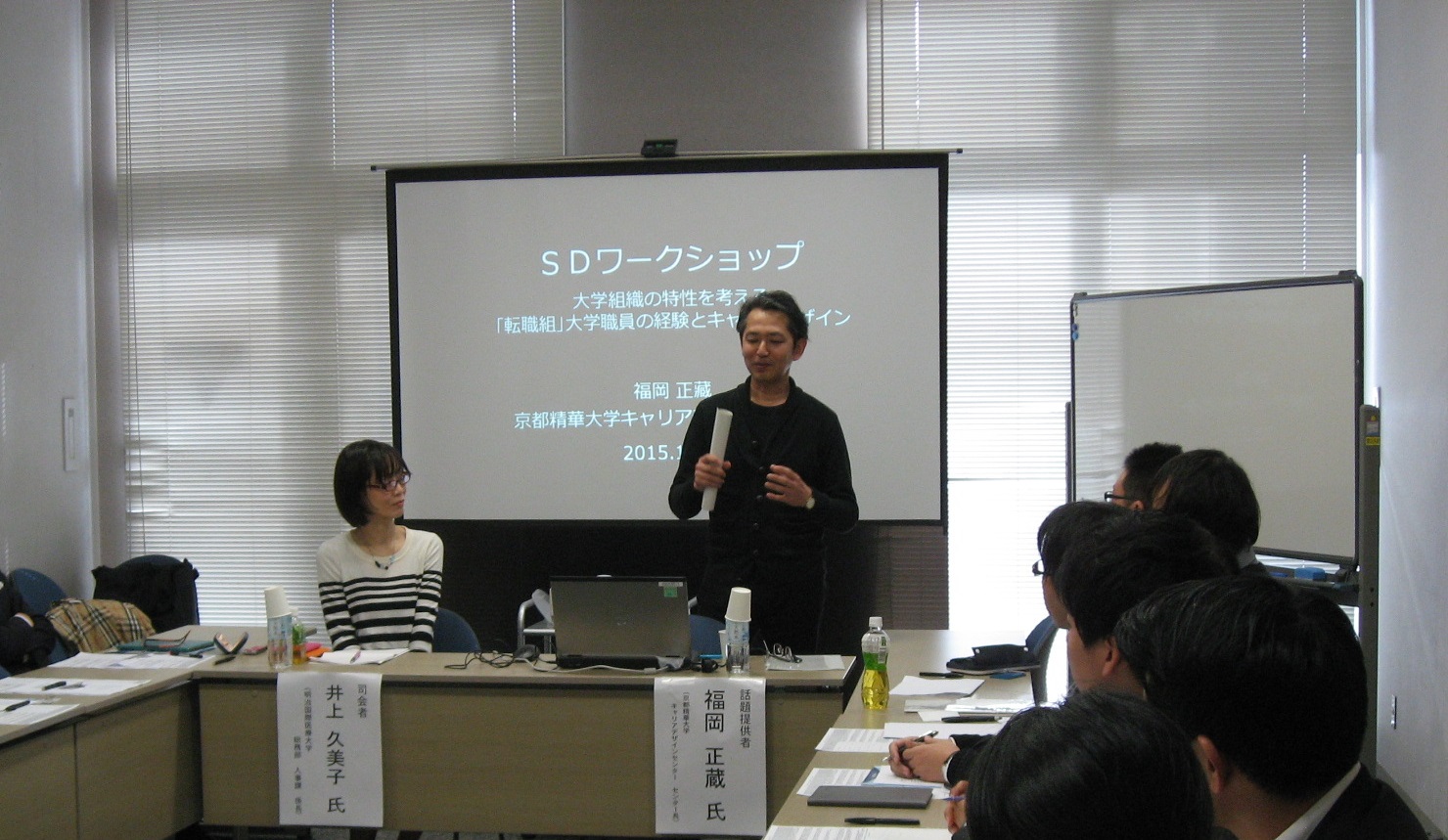
In this workshop, based on the experience of “career changers” who became members of the university organization due to organizational resocialization, we thought about how to foster a workplace culture in which each employee with a career and expertise that differs from the characteristics of the university organization can recognize each other’s values and abilities and demonstrate their abilities.
In the first icebreaker, we sorted the order several times, such as “in order of birthday” and “in order of the earliest time to wake up in the morning,” and naturally talked to the person next to us, and the training began in a friendly atmosphere early.
Participants commented that by dividing the groups into groups on the spot, they were able to ask each other questions they wanted to ask and the work environment and situation of the career changers at other universities.
Report on the 2nd SD Workshop
On Saturday, December 5, 2015, as the second project of the SD Workshop Training 2015, “Mentoring Facilitation Basics and Experiential Training” was held, with a total of 10 participants from member and non-member schools.
Schedule on the day
・Explanation of the overall purpose, icebreaker
・Mentoring course & experience
・Facilitation Courses & Experiences
・Conclusion
The workshop consisted of two parts, “Mentoring Course & Experience” and “Facilitation Course & Experience,” and in the first half, Mr. Izunori Watanabe of the Human Resources Planning Division, General Affairs Department, Doshisha University, gave a lecture on the basics of mentoring, citing examples from Doshisha University, and then moved on to the mentoring experience. In each group, one mentor, one mentee, and two observers were assigned to role-play cases such as “new employees who continue to make mistakes, are often warned by their superiors, and are not energetic,” “new employees who do not fit in with the work environment,” “new employees who have no particular problems so far,” and “new employees who are negative about the mentoring system.” Each group presented what they had noticed through the practical experience.
In the second half, following a lecture on facilitation by Mr. Ryo Suzuki of the Co-op Education Research and Development Center F Kobo of the Kyoto Sangyo University Institute for the Promotion of Common Education, practical training was held with the aim of becoming aware of one’s own relationship with others and behavior through facilitation experience in a space away from daily work. One member of the group acts as a facilitator and discusses themes such as “What made me happy, what I had troubled, what went well, and what didn’t go well ……in situations where I was mentored or consulted by junior employees and new employees,” and “What went well and what didn’t go well in business meetings between staff,” and shared the impressions and impressions I got from them within the group. We looked at how it can be applied to daily work.
Finally, the coordinator reviewed the training program, reaffirmed its objectives, and summarized the results to promote understanding of the training.
Participants commented, “I was able to experience mentoring and facilitation and became aware of my own issues,” “I was very tired because of the work, but I was able to realize and learn in a short time,” and “I am really glad that I participated because it was a serious and informative practice, but it was not formal.” It was evident that there was a high level of satisfaction with the experiential training with a large amount of work allocation. Thanks to the active efforts of everyone who participated, the training was even more meaningful.
Report on the 1st SD Workshop
On Saturday, November 28, we invited Mr. Tsubasa Endo, Assistant Director, University Promotion Division, Higher Education Bureau, Ministry of Education, Culture, Sports, Science and Technology, as the first project of the SD Workshop Training 2015, entitled “Trends in Higher Education Policy ~University Reform to Adapt to Population Decline and Globalization~” as the first project of the “SD Workshop Training 2015”, which was attended by a total of 16 people from member and non-member schools.
Schedule on the day
・Icebreaker (self-introduction by all participants)
・Topic provision
・Group work
・Presentations by representatives of each group
In the workshop, after an icebreaker (self-introductions by the participants), Mr. Endo talked about the current situation and challenges of higher education policy, 1. Current situation surrounding universities, 2. Role of regional universities in the face of declining population, and 3. Efforts to respond to globalization.
One of the major challenges facing Japan society as a whole is how to overcome the major waves of population decline and globalization. The Ministry of Education, Culture, Sports, Science and Technology, which is responsible for policymaking, also reported on the current situation of various discussions, and together with the participants, we set a theme for the university’s issues, such as what the university should be in the future, and conducted group work.
In the presentations from each group, there were presentations on the current situation of impasse and solutions to such issues as “human resource development of staff,” “expertise of staff,” and “reform of university entrance examinations.”
Inquiries
University Consortium Kyoto SD Project
TEL 075-353-9163 FAX 075-353-9101
〒600-8216 Shimogyo-ku, Kyoto-shi, Nishitoin-dori, Shiokoji, Shimo-ku, Kyoto, Campus Plaza Kyoto
* Reception hours: Tuesday ~ Saturday 9:00 ~ 17:00 (excluding year-end and New Year holidays)














